Aleksandra Mastelica: Participating in co-op and professional development
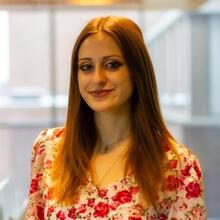 As Aleksandra began her graduate school co-op experience, she felt confident in her foundational professional development skills, such as crafting resumes and being able to answer interview questions. One of the most challenging parts of co-op was stepping out of her comfort zone and applying to new industries. This is one task she did not regret. In her own words, "It can be very difficult to make that first step and try something new, but it is so worth it".
As Aleksandra began her graduate school co-op experience, she felt confident in her foundational professional development skills, such as crafting resumes and being able to answer interview questions. One of the most challenging parts of co-op was stepping out of her comfort zone and applying to new industries. This is one task she did not regret. In her own words, "It can be very difficult to make that first step and try something new, but it is so worth it".
Amanda Nova: Completing a dual PhD
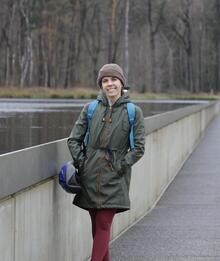 While working on her masters, Amanda was torn on what to pursue afterwards. She had previously visited KU Leuven for a conference and really liked the city, but also loved the environment and her work at UWaterloo. Talking to others about her thoughts, she was introduced to the idea of completing a dual PhD, "I looked around online and realized this is something I could do”. As part of the dual degree, she travelled to Belgium for over a year to learn about their healthcare system, access data and learning opportunities, and broaden her research network. For Amanda, she hopes to share her experiences to help other students: “a lot of people don’t know this exists. I think they don’t know the dual PhD is an option. But it should be an option because different universities see the world differently.”
While working on her masters, Amanda was torn on what to pursue afterwards. She had previously visited KU Leuven for a conference and really liked the city, but also loved the environment and her work at UWaterloo. Talking to others about her thoughts, she was introduced to the idea of completing a dual PhD, "I looked around online and realized this is something I could do”. As part of the dual degree, she travelled to Belgium for over a year to learn about their healthcare system, access data and learning opportunities, and broaden her research network. For Amanda, she hopes to share her experiences to help other students: “a lot of people don’t know this exists. I think they don’t know the dual PhD is an option. But it should be an option because different universities see the world differently.”
Anik Ashirwadam: An international graduate student experience
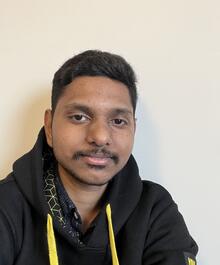 As an international graduate student, Anik has faced and overcome many challenges, the first before he even arrived in Canada – the lengthy application process! Anik recalls the process involved completing an English Language test (IELTS), medical tests, grade requirements, transcripts, and the Statement of Purpose given to the University before he could be accepted. When Anik finally arrived in Waterloo, he experienced his first culture shock with the school dress code, or lack thereof, and the differences in class schedules.
As an international graduate student, Anik has faced and overcome many challenges, the first before he even arrived in Canada – the lengthy application process! Anik recalls the process involved completing an English Language test (IELTS), medical tests, grade requirements, transcripts, and the Statement of Purpose given to the University before he could be accepted. When Anik finally arrived in Waterloo, he experienced his first culture shock with the school dress code, or lack thereof, and the differences in class schedules.
Anish Unnikrishnan: Completing the English language proficiency test
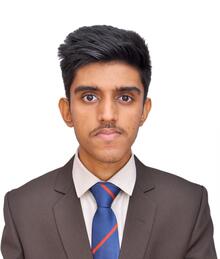 University of Waterloo international graduate student admissions, like other Canadian Universities, require proof of English Language Proficiency (ELP) as part of the application process. For Anish, this meant a requirement to complete an ELP examination. In anticipation for his tests, Anish explains that he began preparing a month prior to his test and found virtual training course offered by LeapScholar to be quite helpful. Preparation for the test included going through specific questions provided under different topics and deciphering the pattern. He read and watched online content to improve his vocabulary and practiced verbally with instructors. Anish describes the oral practice as, “instructors who monitored individual sessions and gave feedback based on our performance which we could improve upon further”.
University of Waterloo international graduate student admissions, like other Canadian Universities, require proof of English Language Proficiency (ELP) as part of the application process. For Anish, this meant a requirement to complete an ELP examination. In anticipation for his tests, Anish explains that he began preparing a month prior to his test and found virtual training course offered by LeapScholar to be quite helpful. Preparation for the test included going through specific questions provided under different topics and deciphering the pattern. He read and watched online content to improve his vocabulary and practiced verbally with instructors. Anish describes the oral practice as, “instructors who monitored individual sessions and gave feedback based on our performance which we could improve upon further”.
Cael MacLeish: Writing a PhD dissertation
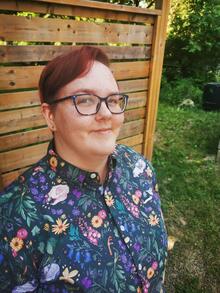 A PhD dissertation is an intimidating task for anyone, even someone like Cael, whose MA thesis was, in their own words, “quite long”! The experience writing an MA thesis had given Cael an idea of how to organize a large writing project. They explain, “for me the biggest hurdle I’ve had is being a source of motivation for myself and working through theoretical challenges alone during the pandemic”. They also are aware that they work best with others and have taken advantage of opportunities available to do so, including Dissertation Boost Camp (offered through the Writing and Communication Centre) and Lake Shift.
A PhD dissertation is an intimidating task for anyone, even someone like Cael, whose MA thesis was, in their own words, “quite long”! The experience writing an MA thesis had given Cael an idea of how to organize a large writing project. They explain, “for me the biggest hurdle I’ve had is being a source of motivation for myself and working through theoretical challenges alone during the pandemic”. They also are aware that they work best with others and have taken advantage of opportunities available to do so, including Dissertation Boost Camp (offered through the Writing and Communication Centre) and Lake Shift.
Kate Posluszny: Conducting graduate research
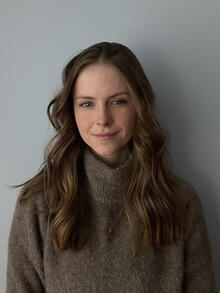 Reflecting back on the experience transitioning from conducting research at an undergraduate level to a graduate level, Kate found, as expected, that her independence to conduct research increased, meaning she needed to be able to teach herself about her research topic. Kate describes, "Essentially, the more research you conduct, the less guidance you should be given. A supervisor’s overall goal is to help train you to conduct research on your own, and therefore, will progressively reduce their involvement/guidance in your research".
Reflecting back on the experience transitioning from conducting research at an undergraduate level to a graduate level, Kate found, as expected, that her independence to conduct research increased, meaning she needed to be able to teach herself about her research topic. Kate describes, "Essentially, the more research you conduct, the less guidance you should be given. A supervisor’s overall goal is to help train you to conduct research on your own, and therefore, will progressively reduce their involvement/guidance in your research".
Kieryn Matthews: Maintaining work/life balance
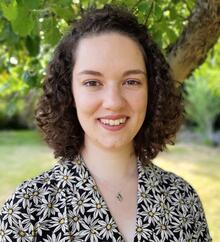 Kieryn admits that deciding to return to school after getting used to a 9-5 workday for seven years was a big decision, but, overall, she’s managed to maintain a regular schedule that leaves her evenings and weekends free. To manage her time, she uses a physical planner that contains deadlines and assignment priorities. She mentions, “It is important to prioritize personal activities too, like ensuring I will get my work done in time to go to the boardgame café with a bunch of friends, for example”. She understands that school can feel overwhelming or even crushing but brings up, “It is important to take a step back and understand this is just a brief period of your life to help get you where you want to go. Take the time to learn, think critically, and make connections but do not let school be the only thing in your life”.
Kieryn admits that deciding to return to school after getting used to a 9-5 workday for seven years was a big decision, but, overall, she’s managed to maintain a regular schedule that leaves her evenings and weekends free. To manage her time, she uses a physical planner that contains deadlines and assignment priorities. She mentions, “It is important to prioritize personal activities too, like ensuring I will get my work done in time to go to the boardgame café with a bunch of friends, for example”. She understands that school can feel overwhelming or even crushing but brings up, “It is important to take a step back and understand this is just a brief period of your life to help get you where you want to go. Take the time to learn, think critically, and make connections but do not let school be the only thing in your life”.
Navya Vikraman Nair: Conducting graduate research
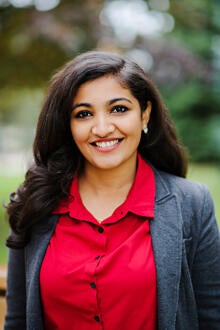 As an international student, conducting research at Waterloo has been an enlightening cultural experience for Navya, but with this there have been other challenges while conducting research. Language barriers and navigating cultural differences complicated her ability to engage the community during her fieldwork. She says, “It has not only broadened my academic horizons but has also provided a platform to actively advocate for the needs of international students. The supportive community, coupled with cutting-edge research facilities, has created a conductive environment for academic and personal growth.”
As an international student, conducting research at Waterloo has been an enlightening cultural experience for Navya, but with this there have been other challenges while conducting research. Language barriers and navigating cultural differences complicated her ability to engage the community during her fieldwork. She says, “It has not only broadened my academic horizons but has also provided a platform to actively advocate for the needs of international students. The supportive community, coupled with cutting-edge research facilities, has created a conductive environment for academic and personal growth.”
Nicholas Pellegrino: Writing a master’s thesis
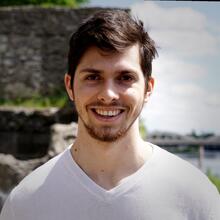 Throughout grad school, Nicholas says writing papers, proposals, and abstracts was daunting and, as is not an uncommon experience, “writing a whole thesis felt nearly impossible”. I felt at a loss for what I would even write in my thesis”. However, Nicholas didn’t give up, and neither did his supervisors. With the mentorship provided by his supervisor, who always had faith in him, he was offered a higher-level perspective that gave him inspiration and insight for what to include in his thesis. Reflecting back on his master’s experience, Nicolas says he wishes he had understood how much work he had actually already done, so he advises other students to just begin writing, “start with what you know, the basic chapters, maybe some sub-sections, and fill-in details wherever you can”.
Throughout grad school, Nicholas says writing papers, proposals, and abstracts was daunting and, as is not an uncommon experience, “writing a whole thesis felt nearly impossible”. I felt at a loss for what I would even write in my thesis”. However, Nicholas didn’t give up, and neither did his supervisors. With the mentorship provided by his supervisor, who always had faith in him, he was offered a higher-level perspective that gave him inspiration and insight for what to include in his thesis. Reflecting back on his master’s experience, Nicolas says he wishes he had understood how much work he had actually already done, so he advises other students to just begin writing, “start with what you know, the basic chapters, maybe some sub-sections, and fill-in details wherever you can”.
Pamela Hopwood: Mature student experiences
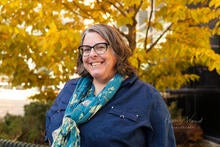 Returning to Waterloo as a mature student gave Pamela a sense of revitalization, sparking intellectual and personal growth. In particular, she explains how working closely with her supervisor, Ellen MacEachen, has empowered her by providing the support she needs to exceed her own expectations. “It’s incredibly powerful to have a mentor with extensive experience in research and leadership, [and] as a mature student, I think I have more appreciation of this transformative relationship than I would have had when I was younger.” At the same time, Pamela has also faced particular challenges returning to Waterloo as a mature student. Though she has made some great friends of many ages, she acknowledges that it can be more difficult to find a peer group among other students. The rapid pace of technological change has also been a challenge, with a potentially steep learning curve for mature students using the new tools and platforms that have become increasingly ubiquitous in graduate school. One of the key messages Pamela has for other mature graduate students is to trust themselves. “Stick to the habits that have helped you succeed in your life and education previously – if they’ve worked so far, you’re likely on the right track!”
Returning to Waterloo as a mature student gave Pamela a sense of revitalization, sparking intellectual and personal growth. In particular, she explains how working closely with her supervisor, Ellen MacEachen, has empowered her by providing the support she needs to exceed her own expectations. “It’s incredibly powerful to have a mentor with extensive experience in research and leadership, [and] as a mature student, I think I have more appreciation of this transformative relationship than I would have had when I was younger.” At the same time, Pamela has also faced particular challenges returning to Waterloo as a mature student. Though she has made some great friends of many ages, she acknowledges that it can be more difficult to find a peer group among other students. The rapid pace of technological change has also been a challenge, with a potentially steep learning curve for mature students using the new tools and platforms that have become increasingly ubiquitous in graduate school. One of the key messages Pamela has for other mature graduate students is to trust themselves. “Stick to the habits that have helped you succeed in your life and education previously – if they’ve worked so far, you’re likely on the right track!”
Pershia Norovzian: Experiences while travelling abroad
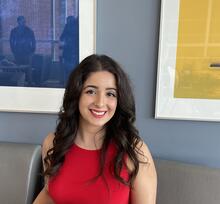 As a PhD student, Pershia was able to travel to Sydney, Australia to work at the University of Sydney as a visiting research scientist for a six month stay. It took her a few weeks to gather the documents (invitation letters, health coverage information, etc.), and then a few additional weeks for her paperwork to be processed to receive the Visa. Once Pershia was able to settle into her accommodations, she shares she has been able to explore the beauty of Sydney, including the beaches and nearby mountains. “Growing up in a small town in Hamilton”, Pershia says, “I was overwhelmed with the endless experiences available”.
As a PhD student, Pershia was able to travel to Sydney, Australia to work at the University of Sydney as a visiting research scientist for a six month stay. It took her a few weeks to gather the documents (invitation letters, health coverage information, etc.), and then a few additional weeks for her paperwork to be processed to receive the Visa. Once Pershia was able to settle into her accommodations, she shares she has been able to explore the beauty of Sydney, including the beaches and nearby mountains. “Growing up in a small town in Hamilton”, Pershia says, “I was overwhelmed with the endless experiences available”.
Trupthi Raghu: Completing graduate coursework
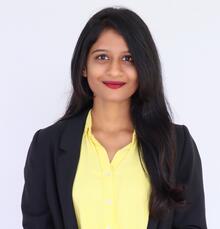 Moving from a undergraduate program to a course-based master’s program, it is typical for students to begin their master’s program with the assumption that graduate course expectations will be fairly similar to what was excepted of them in their undergraduate programs. However, as Truphi shares with us, there are some surprises and differences when beginning graduate level courses. These differences between undergraduate and graduate coursework provided Truphi with many benefits, but did not come without challenges. As a graduate student, Trupthi explains, “graduate studies can sometimes lead to feelings of self-doubt and imposter syndrome […] I started to question my abilities and feel inadequate.” To break free from this feeling, she recognized that these feelings occur in a lot of people, and she is not alone. This led her to seek support from her mentors, peers, and take advantage of services from Waterloo’s Counselling Services and Graduate Student Association. From this, Trupthi gained reassurance and help to overcome these challenges.
Moving from a undergraduate program to a course-based master’s program, it is typical for students to begin their master’s program with the assumption that graduate course expectations will be fairly similar to what was excepted of them in their undergraduate programs. However, as Truphi shares with us, there are some surprises and differences when beginning graduate level courses. These differences between undergraduate and graduate coursework provided Truphi with many benefits, but did not come without challenges. As a graduate student, Trupthi explains, “graduate studies can sometimes lead to feelings of self-doubt and imposter syndrome […] I started to question my abilities and feel inadequate.” To break free from this feeling, she recognized that these feelings occur in a lot of people, and she is not alone. This led her to seek support from her mentors, peers, and take advantage of services from Waterloo’s Counselling Services and Graduate Student Association. From this, Trupthi gained reassurance and help to overcome these challenges.
Udani De Silva: A teachering assistant experience
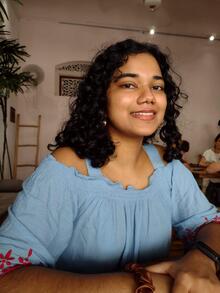 Udani was a Teaching Assistant for the HLTH 304 course by Dr. Annalise Ferro in Winter 2023. She was responsible for holding office hours to mentor and assist students with course content and assignments, mark assignments and provide constructive feedback, and engage on the course discussion boards. Being a TA allowed Udani to interact with students, which she really enjoyed and helped her learn empathy. She explained, “Being a student myself, I try my best to be fair and equitable to all students. I know how dejected I become when I underperform”. Her approach is to have separate section for areas of improvement in feedback, in hopes that students do not make the same mistakes. As an international student TA, Udani also highlights that confidence and asking for help are the most important skills she learned.
Udani was a Teaching Assistant for the HLTH 304 course by Dr. Annalise Ferro in Winter 2023. She was responsible for holding office hours to mentor and assist students with course content and assignments, mark assignments and provide constructive feedback, and engage on the course discussion boards. Being a TA allowed Udani to interact with students, which she really enjoyed and helped her learn empathy. She explained, “Being a student myself, I try my best to be fair and equitable to all students. I know how dejected I become when I underperform”. Her approach is to have separate section for areas of improvement in feedback, in hopes that students do not make the same mistakes. As an international student TA, Udani also highlights that confidence and asking for help are the most important skills she learned.
Yinghao Song: Preparing for next steps after graduation
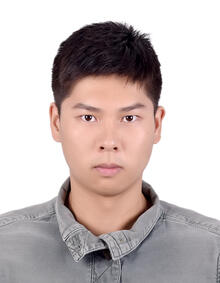 Thinking about his graduation and what comes next after his master’s program, Yinghao is looking forward to seeing the return on investment from his time studying and says he wants to focus on starting his career and connecting with society. After many years as a UWaterloo student, Yinghao is looking to maintain his connection with the University and “expand [his] comfort zone slowly”, so is prioritizing future opportunities in student services, such as working as a student coordinator. The excitement of seeing the return on investment and starting his career doesn’t come without its challenges. Though Yinghao didn’t have a formal internship, he did engage in many opportunities presented to him that have built up his resume!
Thinking about his graduation and what comes next after his master’s program, Yinghao is looking forward to seeing the return on investment from his time studying and says he wants to focus on starting his career and connecting with society. After many years as a UWaterloo student, Yinghao is looking to maintain his connection with the University and “expand [his] comfort zone slowly”, so is prioritizing future opportunities in student services, such as working as a student coordinator. The excitement of seeing the return on investment and starting his career doesn’t come without its challenges. Though Yinghao didn’t have a formal internship, he did engage in many opportunities presented to him that have built up his resume!









